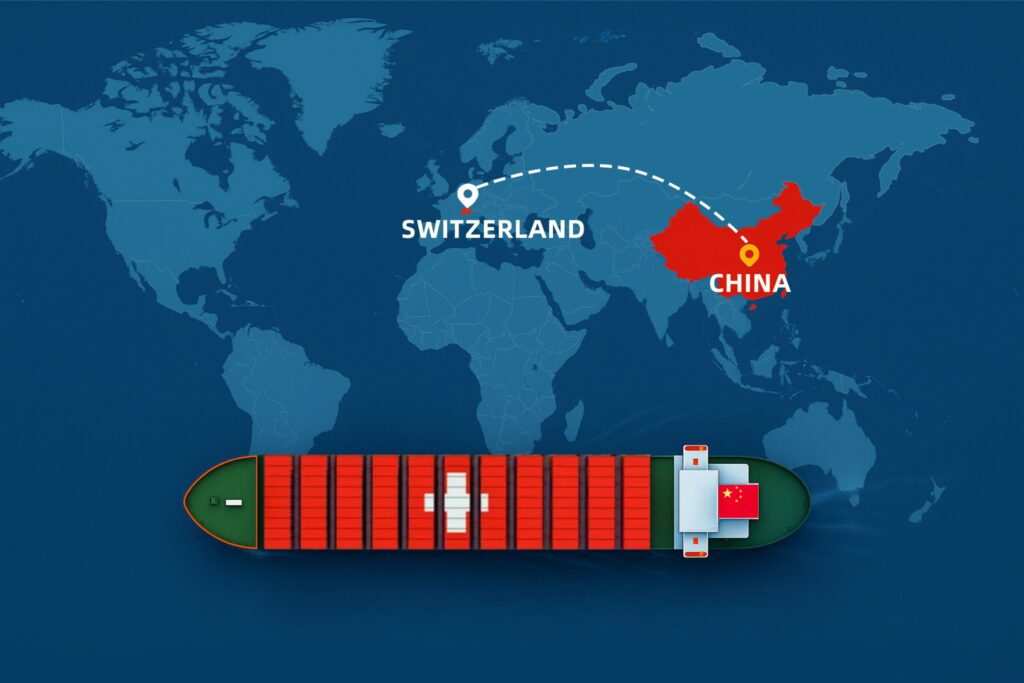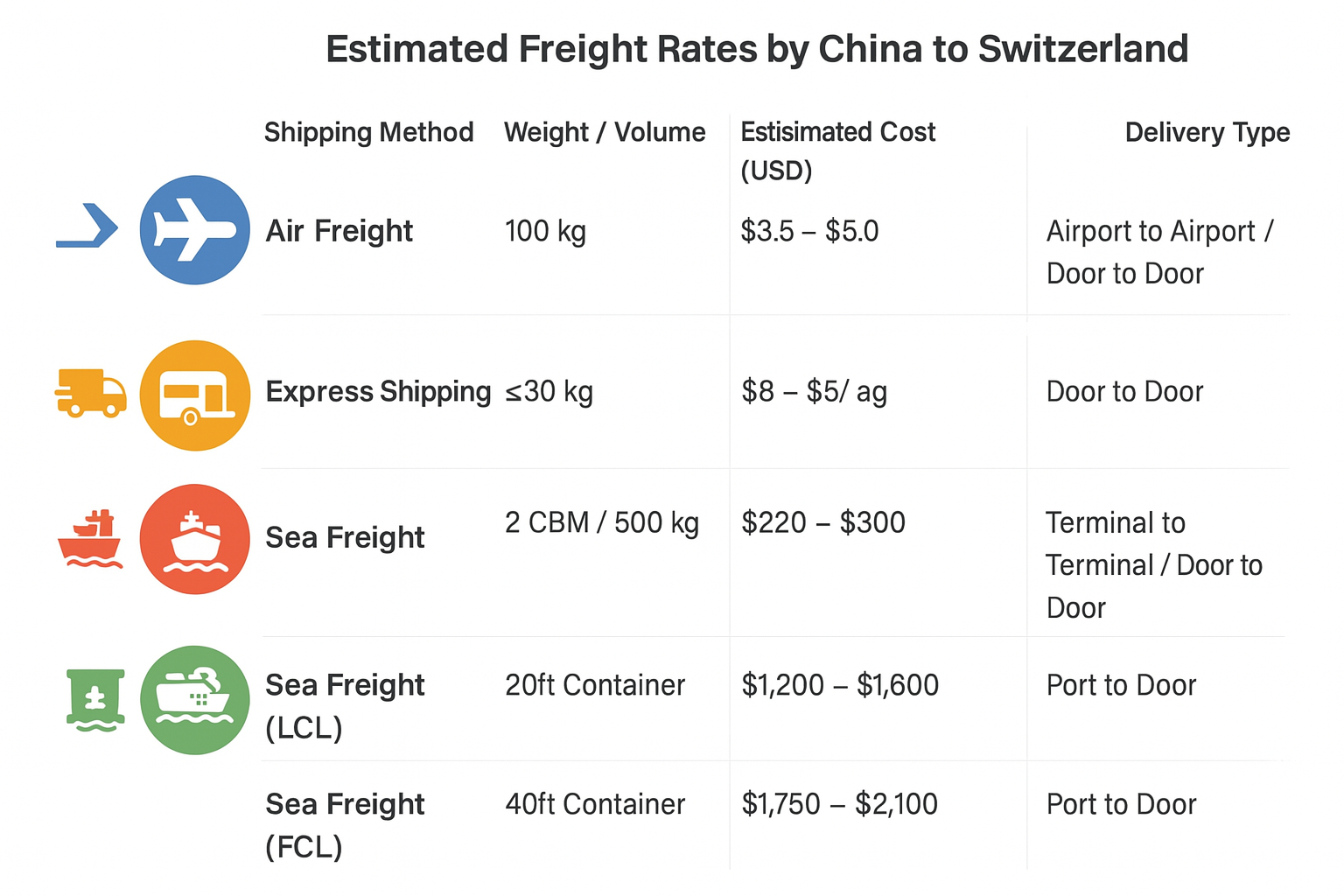Shipping from China to Switzerland has become increasingly vital for Swiss importers, eCommerce businesses, and manufacturers seeking cost-effective sourcing and global supply chain reliability. As China continues to lead global exports in electronics, machinery, textiles, and consumer goods, Switzerland—a landlocked country known for precision industries and high purchasing power—relies heavily on efficient international logistics to ensure timely and secure delivery.
Whether you’re importing bulk goods via sea freight, looking for fast air freight options, or require door-to-door delivery for smaller shipments, understanding the available shipping methods, transit times, freight costs, and customs clearance requirements is essential to avoid delays and unnecessary expenses.
In this comprehensive guide, we will cover:
- The best freight shipping options from China to Switzerland
- Estimated air and sea freight rates for 2025
- Average transit times for different shipping modes
- Step-by-step customs procedures and documentation
- How to choose a reliable freight forwarder
- The pros and cons of rail freight, express shipping, and DDP services
- FAQs for importers and businesses shipping to Switzerland
Whether you’re a first-time importer or a seasoned logistics manager, this guide will help you navigate the complexities of international shipping from China to Switzerland with clarity and confidence.

Shipping Methods from China to Switzerland
Choosing the right shipping method depends on your cargo type, delivery urgency, and budget. Below are the most common and reliable options for shipping from China to Switzerland, each offering distinct advantages in terms of transit time, cost, and convenience.
Air Freight from China to Switzerland
Air freight is the fastest option for time-sensitive deliveries, making it ideal for electronics, medical equipment, and other high-value or perishable goods. With frequent direct flights from Chinese cities like Shanghai, Shenzhen, and Guangzhou to Zurich Airport, air cargo ensures fast and reliable delivery.
- Transit Time: 3 to 7 days
- Best for: Urgent shipments, high-value goods, small and medium-sized cargo
- Cost: Typically $3.5–$5.0 per kg (subject to fuel surcharge and gross weight vs. volumetric weight)
- Service: Available as port-to-port or door to door shipping
Air freight to Switzerland is handled by major carriers such as Emirates, Lufthansa Cargo, and Swiss WorldCargo, ensuring reliable routes and advanced tracking systems.
Sea Freight (Ocean Freight)
For larger shipments, sea freight remains the most cost-effective shipping mode. Since Switzerland is landlocked, ocean freight is routed through nearby European ports such as Rotterdam (Netherlands), Genoa (Italy), or Hamburg (Germany), then transported by truck or rail to the final destination in Switzerland.
- Transit Time: 30 to 40 days (including inland transport)
- Best for: Bulk goods, oversized cargo, heavy machinery
- Shipping Types:
- FCL (Full Container Load): Ideal for full 20ft or 40ft containers
- LCL (Less than Container Load): Suitable for smaller loads shared with other importers
- Cost: Starting from $1,200 per 20ft container
Despite the longer shipping time, ocean freight remains popular for its affordability and scalability.
Rail Freight (China–Europe Railway)
Rail freight is a growing alternative that balances speed and cost. Using the China–Europe Railway Express, goods are shipped overland via countries such as Kazakhstan, Russia, and Poland, and delivered to key logistics hubs like Basel or Zurich.
- Transit Time: 18 to 22 days
- Best for: Medium-sized shipments, palletized goods, non-urgent cargo
- Cost: Cheaper than air, faster than sea
Rail freight from China is particularly useful for B2B shipments that require faster delivery times without incurring the high costs of air shipping.
Express Shipping (Courier Services)
If speed is your top priority, express shipping offers the fastest and most reliable solution—perfect for urgent shipments or small parcels. Major international couriers like DHL, FedEx, UPS, and TNT offer door to door service from China to any Swiss address.
- Transit Time: 2 to 5 days
- Weight Limit: Up to 300 kg per shipment (for cost-efficiency)
- Cost: $8–$15 per kg, depending on volume and speed
- Tracking: Real-time updates via courier platforms
This is the preferred solution for eCommerce sellers, sample shipments, and time-sensitive goods requiring fast clearance through Swiss customs.
Comparing the Shipping Modes
| Shipping Method | Transit Time | Typical Use Case | Cost Efficiency | Speed |
|---|---|---|---|---|
| Air Freight | 3–7 days | Electronics, urgent items | Medium | ⭐⭐⭐⭐ |
| Sea Freight | 30–40 days | Large/bulk cargo | ⭐⭐⭐⭐⭐ | ⭐ |
| Rail Freight | 18–22 days | Palletized B2B shipments | ⭐⭐⭐⭐ | ⭐⭐⭐ |
| Express Shipping | 2–5 days | Samples, small parcels | Medium–High | ⭐⭐⭐⭐⭐ |
Shipping Costs from China to Switzerland (2025 Update)
Understanding the estimated shipping costs from China to Switzerland is essential for budgeting and selecting the most cost effective shipping method. Rates vary depending on factors such as cargo weight, dimensions, shipping mode, and final destination in Switzerland.
Below is a reference chart for average freight rates in 2025:
Estimated Freight Rates by Mode
| Shipping Method | Weight / Volume | Estimated Cost (USD) | Transit Time | Delivery Type |
|---|---|---|---|---|
| Air Freight | 100 kg | $3.5 – $5.0 / kg | 3 – 7 days | Airport to Airport / Door to Door |
| Air Freight | 300 kg | $2.8 – $4.2 / kg | 3 – 7 days | Airport to Airport / Door to Door |
| Express Shipping | ≤ 30 kg | $8 – $15 / kg | 2 – 5 days | Door to Door |
| Rail Freight | 2 CBM / 500 kg | $280 – $400 | 18 – 22 days | Terminal to Terminal / Door to Door |
| Sea Freight (LCL) | 2 CBM / 500 kg | $220 – $300 | 30 – 40 days | Port to Door |
| Sea Freight (FCL) | 20ft Container | $1,200 – $1,600 | 30 – 40 days | Port to Door |
| Sea Freight (FCL) | 40ft Container | $1,750 – $2,100 | 30 – 40 days | Port to Door |
Note: These are average rates. Final pricing depends on your cargo’s gross weight, volumetric weight, packaging, and selected value added services like insurance or warehousing.
What Affects Shipping Costs?
- Shipping Mode – Air freight is faster but more expensive than ocean freight or rail transport.
- Weight & Volume – Chargeable weight is calculated based on actual vs. volumetric weight using international standards (typically with a 6000 divisor for air freight).
- Destination Address – Final delivery to cities like Zurich, Geneva, Bern, or Lausanne may include additional local transport charges.
- Customs Clearance Fees – Duties, VAT, customs broker fees, and handling charges vary based on product type (use correct HS Code).
- Documents Provided – Missing or incorrect commercial invoice, packing list, or additional documents may result in customs delays and fines.
Pro Tip: Use an Online Calculator
For accurate estimates, you can use a CBM and weight calculator to get the chargeable weight of your cargo and determine your best shipping option. This helps avoid hidden costs and plan ahead.
Learn more:
- Shipping from China to Norway
- Shipping from China to Los Angeles
- Shipping from China to Italy
- Cost to Ship a Car to Jamaica from China
- Shipping Cost from China to Netherlands
- Shipping from China to Serbia
- Shipping Cost from China to Ireland
- Shipping Cost from China to the USA

Customs Clearance in Switzerland
All goods shipped from China to Switzerland must go through customs clearance, regardless of the shipping method. Proper documentation and accurate product classification are crucial to avoid customs delays, penalties, or seizure.
Required Documents for Swiss Customs
To ensure a smooth import process, prepare the following documents required for customs clearance:
- Commercial Invoice – Must include the seller and buyer details, HS code, product description, quantity, unit price, and total value
- Packing List – Shows packaging type, weight, dimensions, and number of cartons
- Bill of Lading or Air Waybill – Proof of shipment and transport details
- Certificate of Origin – May be required to qualify for trade agreements or preferential tariffs
- Import License – Required only for restricted goods
- Any additional documents depending on the product category (e.g., CE certificate, test reports, etc.)
Providing accurate and complete documentation helps speed up customs processing and ensures compliance with Swiss regulations.
Import Taxes and Customs Duties
Switzerland applies a customs duty and import tax (VAT) on most imported goods:
- Import VAT: 8.1% (standard rate) on CIF value (Cost + Insurance + Freight)
- Customs Duties: Calculated based on product type and gross weight (in kg), using Switzerland’s customs tariff
- HS Code Classification: Crucial for calculating correct duty and tax. Misclassification can result in fines or entry denial
You can look up specific customs tariffs and duty rates using the Swiss TARES system.
Role of a Customs Broker
A licensed customs broker or a freight forwarder can handle customs formalities on your behalf:
- Submitting declarations
- Paying duties and taxes
- Arranging inspection if required
- Ensuring full compliance with Swiss customs law
Hiring a broker can be especially helpful for first-time importers or when dealing with high value, regulated, or large-volume shipments.
Common Causes of Customs Delays
To avoid shipment issues at the border, be aware of these common mistakes:
- Incomplete or inaccurate commercial invoice
- Wrong HS code or undervalued goods
- Missing certificate of origin (when needed)
- Inconsistent data across documents
- Importing restricted goods without proper licenses
Door to Door Shipping from China to Switzerland
For importers seeking convenience and simplicity, door to door shipping is one of the most popular and reliable options. This full-service logistics model covers everything from pickup at the supplier’s warehouse in China to final delivery at your destination in Switzerland—hassle free.
What Is Door to Door Shipping?
Door to door (DTD) is a freight forwarding service that includes:
- Cargo pickup from the supplier
- Export customs clearance in China
- International transportation by air, sea, rail, or express courier
- Import customs clearance in Switzerland
- Final-mile delivery to the consignee’s address
With this model, the freight forwarder handles all aspects of the shipment, including documentation, customs duties, and local delivery—allowing you to focus on your business.
Key Benefits
- All-in-One Service – Eliminate the need to manage multiple logistics providers
- Time-Saving – No need to coordinate inland haulage or customs brokers yourself
- Transparent Pricing – Most DTD quotes include shipping costs, customs charges, and local delivery
- Real-Time Tracking Systems – Stay updated throughout the shipping journey
- Customizable Add-ons – Choose optional value added services like repacking, insurance, warehousing, or labeling
Final Destination Coverage in Switzerland
Door to door delivery is available to all major Swiss cities and regions, including:
- Zurich
- Geneva
- Bern
- Basel
- Lausanne
- Lucerne
- St. Gallen
Local delivery is usually handled via truck and takes 1–3 days after customs clearance, depending on the shipping mode and cargo type.
Who Should Choose Door to Door Service?
- eCommerce sellers shipping small parcels to customers
- Businesses with limited logistics experience
- Importers of non urgent, bulk, or time sensitive goods
- Clients requiring safe transportation and reliable handling
Door to door is also the recommended option for importers using Delivered Duty Paid (DDP) terms, where the seller or forwarder handles all import-related taxes and clearance.
Tip: When requesting a DTD quote, provide full details such as cargo weight, CBM, HS code, and delivery address to receive accurate pricing with no hidden charges.

How to Choose a Freight Forwarder for China to Switzerland Shipping
Selecting a trustworthy and experienced freight forwarder is key to ensuring a smooth and successful international shipping experience. With multiple shipping modes, paperwork requirements, and customs procedures involved, your forwarder acts as your strategic logistics partner—not just a transporter.
What Does a Freight Forwarder Do?
A freight forwarder handles all operational steps of your cargo movement, including:
- Choosing the best shipping solutions (air, sea, rail, express)
- Coordinating with shipping agents and carriers
- Managing export/import customs clearance
- Preparing essential shipping documents (invoice, packing list, HS code, etc.)
- Providing tracking systems and updates
- Offering value added services like insurance, consolidation, warehousing
Their role is to simplify complex procedures, minimize delays, and protect your shipment from start to finish.
Key Qualities of a Reliable Freight Forwarder
When choosing a freight forwarding service, consider the following:
| Criteria | What to Look For |
|---|---|
| Experience | Specialization in China–Switzerland trade routes and customs regulations |
| Transparency | Clear shipping rates, no hidden fees, full cost breakdown |
| Multi-modal Capability | Offers air, sea, rail, and door to door shipping |
| Global Network | Strong partnerships with carriers, customs brokers, and last-mile agents |
| Communication | Fast responses, multilingual support, proactive issue resolution |
| Customer Reviews | Proven track record of reliability, timely delivery, and professionalism |
Freight Forwarder vs. Courier vs. Shipping Agent
| Role | Best For | Services Offered |
|---|---|---|
| Freight Forwarder | Full shipments, complex logistics | End-to-end freight forwarding services, DDP |
| Courier Company | Small, urgent shipments | Express shipping, tracking, last-mile |
| Shipping Agent | Port-based assistance | Container loading, document handling at origin |
If you’re shipping regularly or dealing with high-value or regulated items, partnering with a reliable freight forwarder is the best long-term strategy.
Tonlexing – Your Freight Partner from China
At Tonlexing Logistics, we specialize in shipping from China to Switzerland, offering customized freight forwarding services across all modes. Whether you need air freight, sea freight, or complete door to door logistics, we provide:
- Transparent pricing and cost control
- Fast customs clearance through Swiss border points
- Local delivery across Switzerland
- Personalized support for every shipment
Need help with your next shipment? Contact us for a free quote today.
FAQs – Shipping from China to Switzerland
How long does it take to ship goods from China to Switzerland?
Transit time depends on the shipping method:
- Air freight: 3–7 days
- Sea freight (FCL/LCL): 30–40 days
- Rail freight: 18–22 days
- Express shipping: 2–5 days
Non urgent cargo is usually shipped via sea to save on costs, while urgent or high-value shipments use air or express delivery.
What is the cheapest shipping method from China to Switzerland?
Sea freight is generally the cheapest shipping option, especially for larger shipments. Rail freight is a good alternative when you need a balance between cost and speed.
For small and lightweight items, express shipping might be more affordable due to simplified customs and last-mile delivery.
What documents are required for importing goods to Switzerland?
The key documents required include:
- Commercial invoice
- Packing list
- Bill of lading or air waybill
- HS code and product details
- Certificate of origin (if needed)
- Any relevant licenses for imported goods
Incomplete paperwork can lead to customs delays or penalties.
What is Delivered Duty Paid (DDP), and is it available for Switzerland?
Delivered Duty Paid (DDP) means the seller or freight forwarder handles all shipping, duties, and taxes—delivering the goods to your address in Switzerland with no extra cost or paperwork for you.
Yes, DDP shipping is available for Switzerland, especially for door to door air and rail services.
How are cargo costs calculated—by weight or volume?
For air freight and express services, the higher of gross weight or volumetric weight is used.
For sea freight, CBM (cubic meters) is the standard unit.
You can calculate this using a CBM calculator to get accurate pricing before booking.
Can I track my cargo during transit?
Yes. Most freight forwarders and courier services offer online tracking systems for your shipments. You can monitor your cargo from departure in China to arrival in Switzerland.
Do I need a customs broker to import from China?
While not mandatory, using a customs broker or a full-service freight forwarder is highly recommended. They will help you classify your goods, manage compliance, and clear customs efficiently.
Final Thoughts
Whether you’re importing bulk machinery, electronics, or eCommerce goods, shipping from China to Switzerland can be streamlined with the right logistics partner. By understanding the various shipping modes, customs requirements, and costs, you can make smarter decisions that save both time and money.
Need expert help? Contact Tonlexing Logistics to get a custom quote and end-to-end support for your next shipment.

